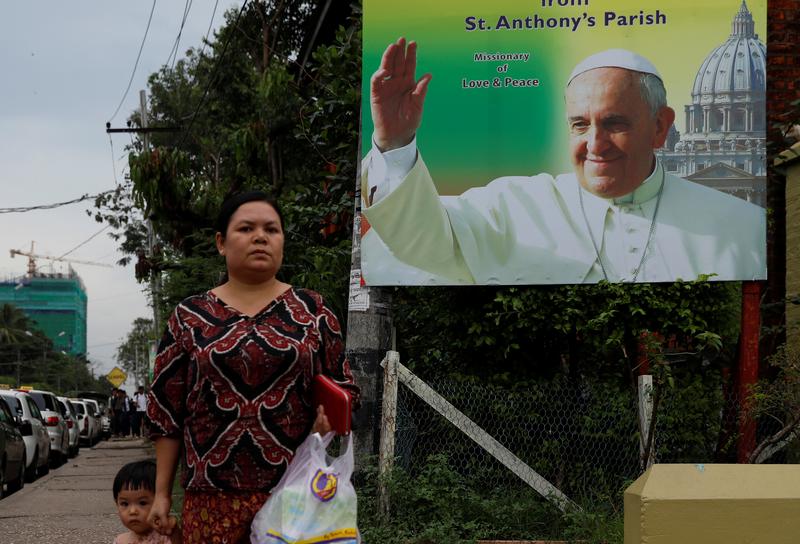VATICAN CITY — Pope Francis visits Burma next week, a delicate trip for the world’s most senior Christian to a majority-Buddhist country accused by Washington of the “ethnic cleansing” of Muslim Rohingya people.
He will also visit Bangladesh to where more than 600,000 people have fled from what Amnesty International called “crimes against humanity” including murder, rape torture and forcible displacement, allegations the Burmese military denies.
The trip is so delicate that some of the pope’s advisers have warned him against even saying the word “Rohingya,” lest he set off a diplomatic incident that could turn the country’s military and government against minority Christians.
The most tense moments of the Nov. 26-Dec. 2 trip are likely to be private meetings with army head Senior-General Min Aung Hlaing and, separately, civilian leader Aung San Suu Kyi.
Burma does not recognise the Rohingya as citizens nor as a group with its own identity, posing a dilemma for Francis as he visits a country of 51 million people where only around 700,000 are Roman Catholics.
“He risks either compromising his moral authority or putting in danger the Christians of that country,” said Father Thomas Reese, a prominent American author and analyst at Religion News Service.
“I have great admiration for the pope and his abilities, but someone should have talked him out of making this trip,” he wrote.
Vatican sources say some in the Holy See believe the trip was decided too hastily after full diplomatic ties were established in May during a visit by Suu Kyi, whose global esteem as a Nobel Peace Prize laureate has been tarnished by expressing doubts about the rights abuse allegations and failing to condemn the military.
“Pope Francis needs to be firm on all fronts. While the violence cannot stop without the cooperation of security forces, Suu Kyi should not be given a free pass either,” said Lynn Kuok, a fellow of the Brookings Institution’s Center for East Asia Policy Studies.
In a late addition to his itinerary, Francis will meet Rohingya refugees on the second leg of his trip in the Bangladeshi capital Dhaka. His meeting with Min Aung Hlaing was also a late addition following negotiations with the military by Burma’s senior churchman, Cardinal Charles Maung Bo.
In a video message sent to Burma last week, Francis said he wanted the trip to lead to “reconciliation, forgiveness and peace,” to further the Gospel values of “dignity for every man and woman” and encourage harmony and cooperation.
The pope has already used the word Rohingya in two appeals from the Vatican this year. Asked if he would say it in Burma, Vatican spokesman Greg Burke said Francis was taking the advice he had been given seriously, but added: “We will find out together during the trip … it is not a forbidden word.”
Senior Vatican sources said the pope will be mindful of not doing anything that could imperil Burma’s transition to democracy.
“The Pope is one of the most respected moral voices in the world today, and for that reason his visit will be significant,” said Richard Horsey, a Yangon-based analyst and former senior United Nations official in Burma.
“But he will be conscious of the fact that popular opinion in Myanmar is firmly behind the government and against the Rohingya, and that the intervention of a Christian leader on this religiously-charged issue could inflame sentiments rather than encourage positive movement,” Horsey said.
US Secretary of State Rex Tillerson on Wednesday called the operation against the Rohingya “ethnic cleansing” and threatened targeted sanctions for “horrendous atrocities.”
[related]
Amnesty International said the Rohingya and Muslims generally in Rakhine State had been subjected to “systemic social and political exclusion” for decades and accused the military of “crimes against humanity” in the last two years including murder, rape torture and forcible displacement.
Burma’s government has denied most of the claims, and the army has said its own probe found no evidence of wrongdoing by troops who say their actions were in response to militant attacks on 30 police posts and an army base in August.
“The Vatican has little by way of carrots and sticks that can help,” said Kuok, the Brookings fellow.
“That said, the pope’s visit can help to raise awareness about the Rohingya community, which may then lead to indirect pressure on governments to do more about the situation there.”



